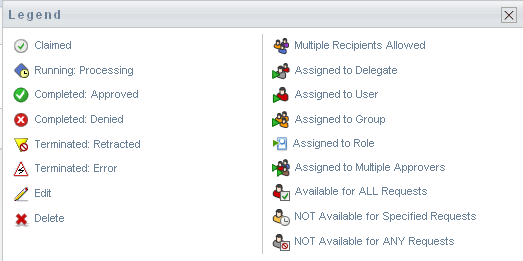|
|
Indicates whether a particular workflow task has been claimed by a user.
Appears on the My Tasks page. |
|
|
Indicates that a particular request is still in process.
Appears on the My Requests and Team Requests pages. |
|
|
Indicates that a particular request has completed its processing and has been approved.
Appears on the My Requests and Team Requests pages. |
|
|
Indicates that a particular request has completed its processing and has been denied.
Appears on the My Requests and Team Requests pages. |
|
|
Indicates that a particular request was retracted by a user (either the user who submitted the request, a team manager, or the Provisioning Application Administrator).
Appears on the My Requests and Team Requests pages. |
|
|
Indicates that a particular request was terminated because of an error.
Appears on the My Requests and Team Requests pages. |
|
|
Lets you edit a proxy or delegate assignment. To edit the assignment, select it and click the icon.
Appears on the My Proxy Assignments, My Delegate Assignments, Team Proxy Assignments, Team Delegate Assignments, Edit Availability, and Team Availability pages. |
|
|
Lets you delete a proxy or delegate assignment. To delete the assignment, select it and click the icon.
Appears on the My Proxy Assignments, My Delegate Assignments, Team Proxy Assignments, Team Delegate Assignments, Edit Availability, and Team Availability pages. |
|
|
Indicates that this resource provides support for multiple recipients. When a resource supports multiple recipients, the action lets you select multiple users as recipients.
Appears on the Request Team Resources page. |
|
|
Indicates that a particular workflow task has been delegated by another user. This task appears in the current user’s queue because the original assignee has declared himself or herself unavailable. Because the current user is the original assignee’s delegate, this user sees the task.
Appears on the My Tasks and Team Tasks pages. |
|
|
Indicates that a particular workflow task was assigned to a user.
Appears on the My Tasks and Team Tasks pages. |
|
|
Indicates that a particular workflow task was assigned to a group.
Appears on the My Tasks and Team Tasks pages. |
|
|
Indicates that a particular workflow task was assigned to a role.
Appears on the My Tasks and Team Tasks pages. |
|
|
Indicates that a particular workflow task was assigned to more than one user.
This icon applies in the following situations:
-
The task has been assigned to a group of addressees, but only one addressee can claim and approve the task. When this approval is given, task execution is considered finished.
-
The task has been assigned to multiple addressees, and all of them must claim and approve the task before the activity can be considered complete.
-
The task has been assigned to multiple addressees, and a quorum of users must claim and approve the task before the activity can be considered complete. The definition of a quorum is configured by the administrator. To define the quorum, the administrator specifies an approval condition that specifies the precise number of approvals or the percentage of approvals needed.
Appears on the My Tasks and Team Tasks pages. |
|
|
Indicates that a particular user is available for all kinds of requests. This setting applies to delegation.
Appears on the Edit Availability and Team Availability pages. |
|
|
Indicates that a particular user is not available for certain kinds of requests during a particular period. This setting applies to delegation. During the time period when a particular user is unavailable for these requests, the user delegated to act on these requests can work on them.
Appears on the Edit Availability and Team Availability pages. |
|
|
Indicates that a particular user is not available for any requests currently in the system. This setting applies to delegation. During the time period when a particular user is unavailable for a request, the user delegated to act on that request can work on it.
Appears on the Edit Availability and Team Availability pages. |
